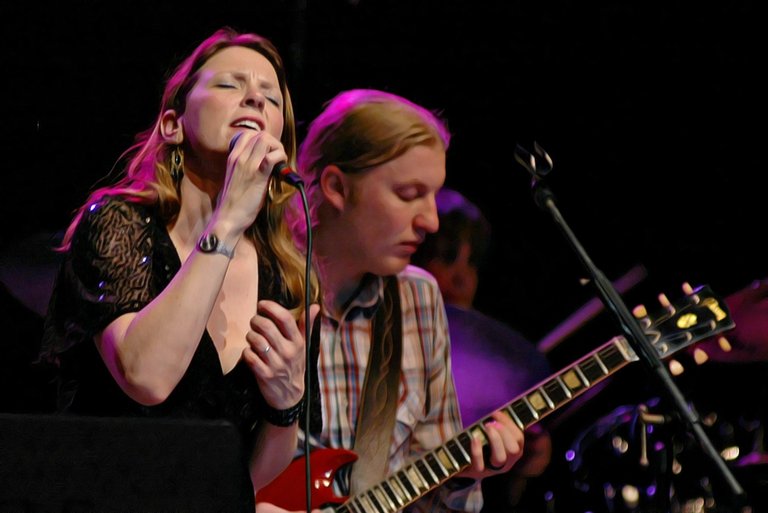 *
*
Most of my interviews have been with instrumentalists, but I did have the chance to speak with one of the most gifted singers on the contemporary music scene, Susan Tedeschi. She is also a fine blues guitarist. Her answer as to what makes for an iconic singer also sheds light on what is important when covering a song.
Alan Bryson: In terms of music, many people feel the human voice holds a special place. You know, there are billions of voices, and like snowflakes, no two are alike. Somehow, after just three notes, you know if it's Ray Charles, Louis Armstrong, Johnny Cash or Aretha Franklin. And, of course, the human voice, unlike an instrument, has the added dimension of combining the beauty of tone with the power of language. It isn't an easy question, but what do you think makes for an iconic singer?
Susan Tedeschi: I really think it has a lot to do with the actual tone of the voice, and like you said, if you can recognize somebody after a few notes it really has something to do with their own special character and blend of all their influences. For example, there was a period when you could listen to Ray Charles and he sounded like Charles Brown. He was singing and copying other people. Later on he developed his own style that was influenced by all these people, but he became the artist we know as Ray Charles.
I think that's very true for me and most singers, you have so many influences. For example, I became friends with Norah Jones back in 2000 when we were doing a show—this was before she had become famous. She was talking about all her influences, people like Billie Holiday and Nina Simone and others, and you could kind of hear a bit of that in her style, but at the same time, even back then she had a very distinct sound. I thought, wow, she really has a sound, you can hear it. She doesn't sound like all the other singers.
That's the thing: you have your influences but you need to have your own style. So many people have influenced me, people like Aretha (Franklin), Etta James, Irma Thomas, Ray Charles and Donny Hathaway. I'm sure they influenced my phrasing, how I might go about creating a certain tone, holding a note, and how to let it out. It's a whole bunch of different variables.
It's interesting when you think about the sound. With Derek, even though he's a guitarist, I think of him as a singer. It's the same, he has a voice and if you hear a couple of notes, you know it's him.
Alan Bryson: Yeah, it's remarkable; without any effects, just a guitar and amp.
Susan Tedeschi: Exactly. And he's a melodic and very vocal player; he sounds like a singer. Do you know what I mean?
Alan Bryson: Yes, especially when he plays slide because he doesn't use frets and it isn't a series of distinct notes. His playing has a fluid singing quality.
Also that's true what you said about Ray Charles—he also went through a period when he was enamored with Nat "King" Cole's singing and piano playing and copied him. But man, once he became the Ray Charles we all love, he could take the most overplayed standard, make it his own, and give you the feeling that you were hearing it for the first time as it should be heard. It's hard to believe that he could give a person goose bumps with a song like "Oh, What a Beautiful Morning," but he did.
Susan Tedeschi: I totally agree, he killed it. I was blown away too when I heard that song—I was like, "That's from Oklahoma?" [Laughing] "Is that the same song!"
When you start out it is natural to have heroes and influences. You work at replicating their sound and mastering their technique. Initially, it is also natural to play to audiences who want a "cover band" to sound as close to the original as possible. You can be a musician and do that, but when you become an artist, you get in touch with your true inner self, and you develop your own musical voice. As mentioned above, you can often recognize these artists after just a few notes. That's not only true with singers, it is true with instrumentalists. Think of guitar players: Albert King, Carlos Santana, Derek Trucks -- after three notes there's a good chance you'll recognize them.
For now, here's the original version of "Oh What a Beautiful Morning" from the film version of the stage musical.
Now listen to the Ray Charles version spoken about above. Try closing your eyes as he vividly paints a picture with his voice, and consider by this point he had lived his entire adult live in darkness. He didn't copy a song, he covered it, and he made it his own.
Hope you tune in tomorrow.
If you're not familiar with my Passivity Experiment, click here for an explanation
 photo by @roused
photo by @roused
- Susan Tedeschi Photo Wiki Commons, Free Use
Great post... GORDON MCRAE! Gordon in my view is one of the best singers ever. His performances in "Oklahoma" with Shirley Jones are absolutely classics. Gordon's voice is really great.
Most people probably remember Shirley Jones from the TV series The Partridge Family and forget was was a singer ;-) You're right Gordon McRae had a tremendously powerful voice, ideal for the theatrical stage.
Thanks for stopping by!
I love Ray Charles song ... Just heard this song for the first time on the Jazz channel. Had to listen to it again. Papa and Count gettin down! Oh what a beautiful song!!!!
When I was a kid we had an elderly music teacher in elementary school who had us sing this song, so I had heard it -- but it came alive for me when the first time I heard Ray Charles sing it.
Nice post I just love his voice so much Gordon MacRae
Glad you liked the post Bengo & glad you stopped by!